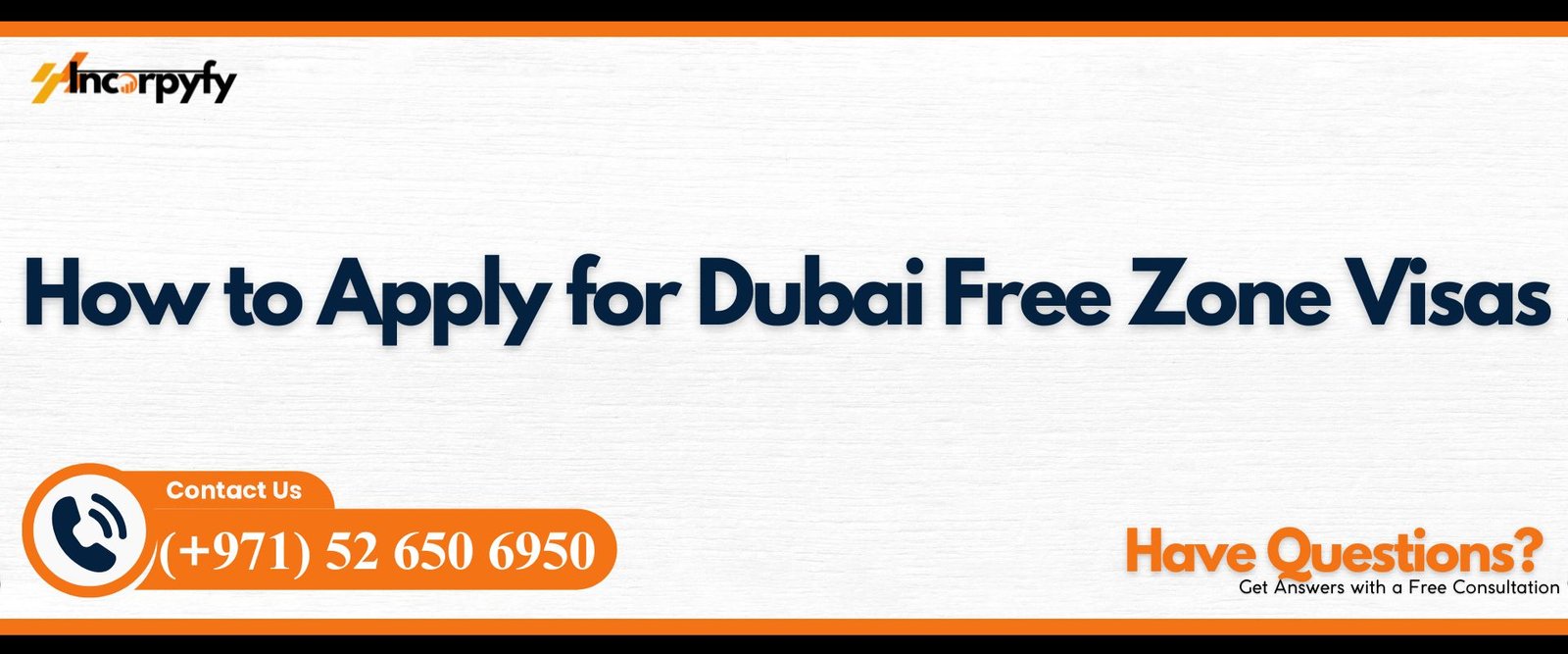
Dubai’s free zones have become global hubs for entrepreneurs, investors, and professionals who want to build successful businesses in the UAE. Each free zone provides tax advantages, 100% foreign ownership, and simplified processes for company formation. However, one essential part of setting up and operating a business in these zones is obtaining the right Dubai free zone visa for yourself, your employees, or dependents.
A free zone visa is a residence and work permit issued to individuals associated with companies registered within any of Dubai’s free zones. It allows you to live and work legally in the UAE and enjoy the numerous benefits that come with being part of the region’s thriving economy.
In this comprehensive guide, you’ll learn everything about how to apply for a Dubai free zone visa, the eligibility criteria, required documents, step-by-step process, costs, and tips to ensure a smooth application experience.
Understanding the Dubai Free Zone Visa
A free zone visa is a UAE residence visa issued through one of Dubai’s free zone authorities. It is available to business owners, employees, and investors who establish or work under a Dubai free zone company. Unlike mainland visas, which are sponsored by employers or local agents, free zone visas are issued directly by the free zone authority itself.
This structure gives entrepreneurs more control and flexibility, as the free zone acts as the official sponsor for visa holders. The visa typically allows the holder to live and work in Dubai for two or three years, depending on the specific free zone’s regulations.
Why Dubai’s Free Zone Visa Is So Popular
Dubai’s strategic location, world-class infrastructure, and business-friendly environment make it one of the most attractive destinations for foreign entrepreneurs. Free zones such as Dubai Multi Commodities Centre (DMCC), Jebel Ali Free Zone (JAFZA), Dubai Airport Free Zone (DAFZA), Dubai Internet City, and Dubai Silicon Oasis are internationally recognized for their streamlined operations and attractive incentives.
With a Dubai free zone visa, you can:
- Legally live and work in the UAE.
- Sponsor your family members or dependents.
- Access local banking and financial services.
- Travel in and out of the UAE freely.
- Open utility accounts and rent property under your name.
Types of Free Zone Visas Available in Dubai
Dubai offers various free zone visas, including investor, employment, dependent, and freelancer visas, each designed to meet specific business, professional, and personal residency needs.
Investor or Partner Visa
This visa is issued to company owners or shareholders in a free zone company. It is valid for up to three years and allows the holder to manage and operate the business.
Employment Visa
An employment visa is for staff members or employees working under a free zone company. The company must apply on their behalf through the free zone authority.
Dependent Visa
A dependent visa allows the visa holder to sponsor family members such as a spouse, children, or parents. The sponsor must meet the minimum salary and accommodation requirements to be eligible.
Freelancer Visa
Some free zones, such as Dubai Media City and Dubai Internet City, offer freelancer visas for professionals like writers, designers, developers, and consultants who wish to work independently.
Eligibility Criteria for a Dubai Free Zone Visa
Before applying, make sure you meet the eligibility requirements. Generally, you must:
- Own or work for a company registered in a recognized Dubai free zone.
- Hold a valid business license.
- Have a valid passport with at least six months’ validity.
- Pass the medical fitness test and security clearance.
- Fulfill salary or investment thresholds (for dependents).
Each free zone may have slightly different eligibility conditions, so always confirm with the specific authority.
Step-by-Step Process to Apply for a Dubai Free Zone Visa
Applying for a Dubai free zone visa involves company setup, entry permit, medical test, Emirates ID registration, and visa stamping to obtain legal residency and work authorization.
Step 1: Company Formation and License Issuance
The visa application can only begin after your Dubai free zone company is formed and your trade license is issued. The free zone authority becomes your sponsor and processes your visa applications.
Step 2: Entry Permit Application
Once your company is active, the free zone authority will apply for an entry permit on your behalf. The entry permit acts as a temporary visa allowing you to enter the UAE if you are outside the country or to transition your visa status if you are already inside. The permit is typically valid for 60 days.
Step 3: Medical Fitness Test
Upon arrival or after a status change, all applicants must undergo a medical fitness test at an authorized UAE medical centre. The test includes blood work and a chest X-ray to ensure you are medically fit to reside in the UAE.
Step 4: Emirates ID Application
After passing the medical test, you’ll need to apply for your Emirates ID, the official identification card for all residents. Biometric data such as fingerprints and photographs will be collected.
Step 5: Visa Stamping on Passport
Finally, your passport will be submitted to the immigration authorities for a residence visa stamping. Once completed, you receive your residence visa, and your Emirates ID is delivered shortly afterward. You can now legally live and work in the UAE.
Documents Required for a Dubai Free Zone Visa
The required documents depend on your visa type, but generally include:
- Passport copy (valid for at least six months).
- Passport-size photographs with a white background.
- Entry permit (if applicable).
- Copy of the trade license of the free zone company.
- Establishment card.
- Emirates ID application form.
- Medical fitness test results.
- Labour contract (for employees).
- Sponsorship documents (for dependents).
For dependent visas, you may also need marriage certificates, birth certificates, tenancy contracts, and salary slips.
Duration and Validity of Free Zone Visas in Dubai
Free zone visas are generally issued for two or three years, depending on the free zone’s regulations. Some free zones now offer renewable five-year investor visas.
You must renew the visa before it expires to avoid penalties or cancellation. Renewal requires repeating the medical test, updating your Emirates ID, and resubmitting your documents.
Cost of a Dubai Free Zone Visa
The Dubai free zone visa cost varies depending on the free zone authority and visa type. Typically, the total cost ranges from AED 3,500 to AED 7,000 per person. This includes application fees, medical tests, Emirates ID charges, and visa stamping fees.
For dependents, the cost may vary between AED 4,000 and AED 6,000, depending on the number of family members and processing options. Always budget additional costs for renewals and service charges.
Processing Time for a Free Zone Visa
The entire visa process usually takes between 5 and 15 working days, assuming all documents are correct and no additional approvals are needed. Some free zones offer express visa services for an extra fee, which can expedite the process to as little as 3 days.
Benefits of Having a Free Zone Visa in Dubai
A Dubai free zone visa provides tax benefits, full business ownership, easy family sponsorship, banking access, and the freedom to live and work legally in the UAE.
100% Ownership and Control
With a free zone visa, foreign entrepreneurs enjoy full ownership of their businesses without requiring a local sponsor.
Tax Exemption
Free zone companies and their employees benefit from corporate and personal income tax exemptions.
Ease of Family Sponsorship
Visa holders can easily sponsor family members once they meet the income and accommodation requirements.
Hassle-Free Banking and Residency
Having a valid Dubai free zone visa simplifies opening local bank accounts, leasing property, and using government services.
Strategic Location and Global Connectivity
Dubai’s connectivity allows easy travel to Europe, Asia, and Africa, making it a global hub for entrepreneurs.
Difference Between Mainland and Free Zone Visas
While both are residence visas, they differ in sponsorship and work permissions.
- Mainland visas are issued under the Ministry of Labour and allow employees to work anywhere in the UAE.
- Free zone visas are issued by free zone authorities and generally permit work only within that specific zone or under its licensed entity.
However, the free zone route remains ideal for startups and entrepreneurs who value independence and full ownership.
Tips for a Successful Free Zone Visa Application
To ensure smooth approval, prepare all documents early, choose the right free zone, track visa deadlines, and consult experts familiar with UAE immigration regulations.
Prepare Documents Early
Make sure your passport, photos, and business documents are up-to-date before applying.
Choose the Right Free Zone
Each free zone caters to different industries. For example, DMCC focuses on trading, while DAFZA serves logistics and aviation. Select one aligned with your business goals.
Keep Track of Deadlines
Missing renewal dates can lead to penalties or visa cancellation. Maintain a calendar reminder.
Consult Professional Advisors
Partnering with a business setup consultant in Dubai can save time and ensure compliance with immigration and labour rules.
Visa Renewal in Dubai Free Zones
Renewing your visa is a straightforward process similar to your first application. You will need:
- Updated medical fitness certificate.
- Emirates ID renewal form.
- Valid company license and establishment card.
- Renewal fees.
Processing generally takes 3 to 7 working days, and it’s advisable to begin the renewal process one month before expiry.
How Many Visas Can You Get Under a Free Zone Company?
The number of visas depends on the office size and the specific free zone regulations.
- Flexi-desk offices usually allow 1–3 visas.
- Dedicated offices may allow up to 6 visas.
- Warehouses or larger facilities can support dozens of visas based on space allocation.
If you plan to hire multiple employees, consider upgrading to a larger office space in your free zone.
Common Mistakes to Avoid
- Submitting incomplete documentation.
- Missing medical test appointments.
- Applying under the wrong free zone activity.
- Failing to renew on time.
- Not informing authorities about dependent changes.
Being proactive and detail-oriented ensures your application process remains smooth.
Conclusion
Applying for a Dubai free zone visa is a straightforward process when approached with proper planning and documentation. Whether you’re a business owner, investor, or employee, the free zone system offers unmatched flexibility, independence, and growth potential. From selecting the right free zone and preparing your documents to completing your medical test and visa stamping, each step matters.
By staying informed, choosing the correct visa type, and ensuring compliance, you can enjoy a smooth relocation and business operation experience in the UAE. Dubai continues to stand as one of the best destinations globally for entrepreneurs seeking opportunity, security, and lifestyle—all supported by a simple and efficient visa framework.
Frequently Asked Questions (FAQs)
How much does a freezone visa cost in Dubai?
The cost varies between AED 3,500 and AED 7,000 depending on the free zone, visa type, and processing time.
How long is a free zone visa valid?
Most free zone visas are valid for 2 to 3 years, with easy renewal options.
Can I sponsor my family with a free zone visa?
Yes, you can sponsor your spouse, children, and parents if you meet the salary and housing criteria.
Can I work anywhere in Dubai with a free zone visa?
Free zone visas allow work within your specific free zone company; working outside requires proper authorization.
What is the processing time for a Dubai free zone visa?
Typically 5–15 working days, depending on document readiness and approvals.
Can freelancers apply for a free zone visa in Dubai?
Yes, freelancer visas are available in specific zones like Dubai Media City and Dubai Internet City.
Is medical insurance required for free zone visas?
Yes, medical insurance is mandatory for all visa holders in Dubai.
What happens if my visa expires?
If not renewed on time, you may face fines and potential cancellation of your residence status.
How do I cancel a free zone visa?
Visa cancellation must be initiated through the free zone authority before leaving the UAE permanently or transferring to another sponsor.
Can I convert a visit visa to a free zone visa?
Yes, with a status change application, your visit visa can be converted without exiting the country.






